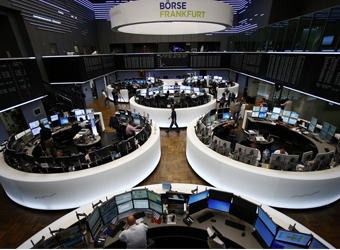European stocks closed lower Friday, as investors monitored global concerns about soaring volatility and rising borrowing costs.
The pan-European STOXX 600 ended down by 1.45 percent, with all sectors and major bourses in negative territory. Britain’s FTSE 100 closed the trading week 4.2 percent lower while the French CAC 40 and German DAX slipped 5.5 percent and 5.3 percent respectively.
Global markets have been swinging between gains and major losses over the past week, as concerns over higher interest rates continue to dwell on investors’ minds.
On Thursday, Wall Street closed sharply lower, despite solid earnings, with the Dow Jones industrial average sinking over 1,000 points — entering correction territory. U.S. stocks were slightly lower Friday, after paring all of the gains made in morning deals.
Shares of L’Oreal ended marginally higher after the cosmetics giant saw sales rise by 5.5 percent in the fourth quarter on a like-for-like basis, topping expectations. Its CEO added the group was “confident” it would outperform the market and produce significant growth in 2018.
Italy’s Mediobanca also closed slightly higher after the bank announced in its earnings that it had increased its dividend payout guidance to 40-50 percent, up from 40 percent.
However, not every earnings report was seen as positive by the market. Amundi fell 6 percent Friday after the asset manager delivered its latest results and an update, which stated that it would target net inflows of no less than 150 billion euros over the 2018-2020 period.
In the U.K., Trinity Mirror closed up around 9.6 percent after announcing the acquisition of Northern & Shell’s publishing assets— with titles including OK!, Daily Star and Daily Express— for around £127 million.
Late Thursday evening, it became apparent parts of the U.S. government would be entering a shutdown, after the Senate failed to secure the passing of a spending bill by the midnight deadline. However, just before Europe’s open, the Senate passed a short-term funding bill giving way to an uptick in military and domestic spending.
The measure then headed to the House, where resistance was expected. Before the U.S. open however, the House decided to pass the bill and send it to President Donald Trump to be signed — helping end the brief government shutdown.
Source: CNBC


